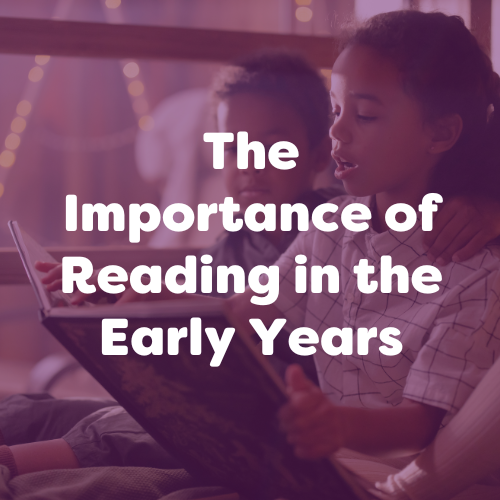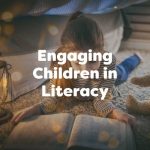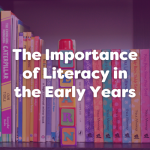There are few things in a child’s early years (birth to 5) more important than reading. Not only is it a fundamental skill for early education, but is required multiple times a day. In this blog, we will delve into the multifaceted importance of reading in the early years, exploring cognitive development, self-confidence and academic success. We will also explore ways in which you can provide excellent opportunities for reading in your setting with activity ideas and rearranging your setting accordingly.

Why is reading in the early years so important?
1. Cognitive development
Put simply, reading stimulates brain cells. It acts as a “workout” for the brain as it stimulates imagination, critical thinking and language skills. The more stimulation the brain receives, the more connections it builds which in turn lays the foundations for later academic success.
The more variety in the books and stories read, the more cognitive development!
2. Later academic success
As mentioned, the cognitive development associated with reading will contribute towards academic success. When children engage in reading from an early age, they improve their general knowledge and language skills and also improve their attention spans and concentration. The latter two are crucial for later schooling.
Atop of these factors, confidence gained through early reading is important to instil a love of learning which will benefit children throughout school.
3. Psychological benefits
Perhaps an often overlooked benefit of reading in the early years are the psychological benefits this can have. Reading and being read to allows children to explore empathy and thus facilitates emotional development. Certain characters and storylines will encourage children to think critically about emotions and feelings whilst in a safe and controlled environment.
4. Self-confidence
Often children can feel pressure when learning new skills in school, particularly if perhaps they feel they are developing at a slower pace than their peers. This can have wider implications for their self-image and thus impact the way they learn and feel about school moving forward. This is one of the key reasons why reading at an early age is so important. Starting to read with your child early on will encourage them to learn at their own pace in a safe environment and will improve their self-confidence amongst peers.
5. Enhanced Communication
Naturally, early reading will contribute towards children’s vocabulary and knowledge but it also increases the exposure children have to the likes of:
- Spelling
- Grammar
- Writing
- Oral communication
- Critical thinking
Ways to make reading a fun part of your setting
Below are some ideas to try with your little one to make reading a fun and enjoyable part of your routine.
- Involve your children: this could be in the selection of the book itself or through interaction during the story. Why not try asking children to predict what will happen next in the story, ask questions or come up with an alternative ending?
- Introduce themes: these themes could be tailored to your child and their interests. For example one week why not explore animals in your reading, or perhaps another week you set the theme of colour and each day you explore a different colour?
- Incorporate props: a lot of books these days come with accompanying puppets or story sacks. Such resources are a great way to get children involved in the story as they act it out using the props, this could be via a puppet show, dressing up or simply holding the characters.
- Create a dedicated zone: why not create a den with your child? This will naturally spark their excitement and will get them wanting to read! Your zones could be themed around the story you are reading or simply be a cosy little nook that is comfy and inviting.
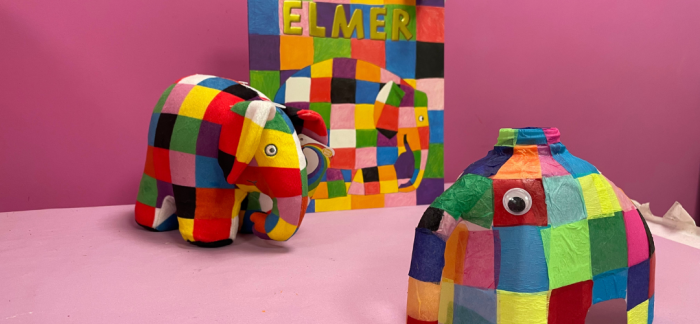
Creating an EYFS reading area
As mentioned, creating a dedicated EYFS reading area can be a great way to make reading fun for children. Below are some top tips to consider when creating your reading area:
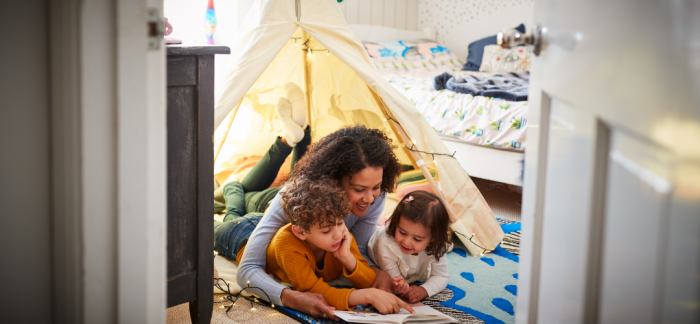
- Create a comfortable and inviting space for children and adults using a combination of cushions, sofas and much more!
- Why not build a little den or simply pile cushions and blankets into a cosy little corner that will encourage children to get comfy with their favourite book
- Make sure books are accessible for children
This means making sure they are stored on shelves or in cupboards that are child-height. Also make sure that are storage containers you are using are not too heavy for children to move about. Encourage children to choose independently. - Create a book display to spark interest
Display books in a visually appealing way, this could be by category or theme or could incorporate interactive displays that will encourage exploration - Add some interactive elements such as a box of props or toys
This will make the reading area a dynamic space. Including resources related to the books will reinforce the story and make learning more enjoyable - Display and celebrate reading achievements
This can work to motivate children is their achievements are proudly displayed for all to see
Hopefully, this blog has given you a little insight into some of the benefits of reading and therefore the importance of reading in the early years. In making reading a fun and enjoyable experience and creating dedicated EYFS reading areas, educators and parents can lay the groundwork for a lifelong love of learning and your children will reap the many benefits that this encompasses. Why not top up your book supply with our range of storysets, traditional tales and classic books?

Let us know how you encourage your little ones to read by tagging us on social media using the hashtag #ExploreWithEYR
FAQ’s about reading in the early years
What does Ofsted look for in early reading?
Inspectors will consider the extent to which:
- Direct, focused phonics is taught every day in Reception and KS1
- Children read from books with sounds they know as they are learning to read
- Teachers and teaching assistants provide extra practice throughout the day for children who make the slowest progress (lowest 20%)
- All children in Year 3 and above can read age-appropriate books,
- Teachers instil in children a love of literature and reading: the best stories and poems
Learn more about early reading and the inspection framework.
How can we promote reading in the early years?
- Providing children with a wide selection of reading material, whilst allowing children to choose books from themselves.
- Encourage the learners to ask questions about the books, clarifying what each word means or summarising the story that they have read or heard.
Incorporate the use of story sacks or small world toys for children to use as they read stories or gather around for story time.

